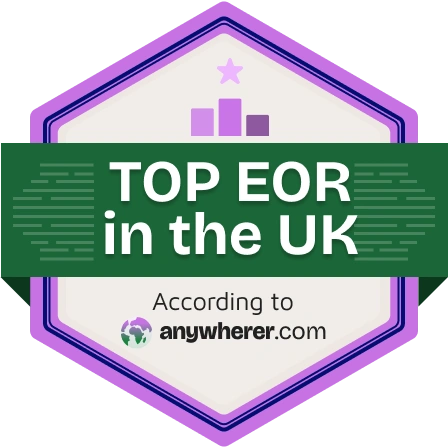TABLE OF CONTENTS
- Staffing Agency: How Do They Work?
- What Do EOR Companies Do?
- What Are the Differences Between an Employer of Record and a Staffing Agency?
- Is a Staffing Agency More Expensive Than an EOR Solution?
- What Are the Benefits of Using an EOR?
- Benefits of Using a Staffing Agency
- Legal and Administrative Responsibilities
- Flexibility in Hiring
- When to Choose an Employer of Record or Staffing Agency
- Which One Is Right for Your Business?
- Can an EOR Help with Global Recruitment?
- Financial Risks and Mitigation
- Conclusion
As global business expands beyond borders, companies are reevaluating how they hire, onboard, and manage talent. Whether hiring locally or internationally, the pressure to remain compliant with labor laws, manage payroll benefits, and reduce administrative overhead is ever-increasing. Two models dominate the space: the Employer of Record (EOR) and the staffing agency. While often confused, they serve different purposes, and choosing the right one can drastically impact your operations.
Staffing Agency: How Do They Work?
Staffing agencies play a vital role in connecting employers with qualified job seekers, streamlining the hiring process, and providing access to a wide talent pool. A staffing agency primarily focuses on sourcing and recruiting workers for companies, handling tasks such as job postings, resume screening, interviewing candidates, and negotiating employment terms. By leveraging their expertise and extensive networks, staffing agencies can quickly identify and place suitable talent, saving businesses time and resources.
Purpose
A staffing agency, also known as a recruitment or employment agency, is a business that acts as an intermediary between companies and job seekers. Their primary purpose is to find suitable talent to fill open positions, whether temporary, contract, or permanent, and to provide employers with a cost-effective and efficient hiring solution. By partnering with a staffing agency, client companies can tap into a vast network of pre-screened candidates, reducing the time and effort required to find the right fit for their organization.
Access to Talent Pool
One of the significant advantages of working with a staffing agency is access to a diverse and extensive talent pool. Many staffing agencies have established relationships with job seekers, including those with specialized skills and experience, and can quickly identify top candidates for open positions. This access to quality candidates enables companies to find the best talent for their needs, improving the overall hiring process and reducing the risk of making a poor hire.
What Do EOR Companies Do?
As businesses expand into new regions or embrace remote-first operations, navigating employment laws, payroll taxes, and global compliance becomes a major challenge. That’s where an Employer of Record (EOR) comes in, a partner that allows you to hire employees in a foreign country without establishing a legal entity. EORs handle comprehensive employee management activities, particularly in international operations.
But an EOR is more than just a shortcut to global hiring, it’s a comprehensive solution for managing the complexity of international employment. Here are the top benefits of using an EOR:
1. Fast, Compliant Hiring Across Borders
One of the most significant advantages of using an EOR is the ability to hire employees internationally, often in days rather than months. Instead of setting up a subsidiary or branch office in another country, your EOR becomes the legal employer, taking care of:
- Employment contracts
- Country-specific labor laws
- Payroll taxes and filings
- Required benefits packages
This means you can tap into global talent without worrying about local employment law compliance or corporate infrastructure.
2. Reduced Risk of Non-Compliance
Every country has its own employment-related regulations, including complex rules on termination, statutory leave, tax treatment, and benefits. A misstep can result in penalties, lawsuits, compliance risks, or reputational damage. An EOR ensures that your hiring process and employment terms are fully compliant with local labor laws, so you don’t have to become an expert in each market.
3. Simplified Payroll and Tax Management
Managing payroll across multiple jurisdictions is notoriously difficult. Each region has unique requirements for:
- Withholding and remitting taxes
- Calculating social contributions
- Disbursing payments in local currencies
- Providing payroll benefits
EORs handle all of this for you. They manage payroll and tax filing for tax purposes, ensuring compliance with local regulations. They ensure timely, accurate payroll while managing all administrative tasks related to compensation, removing the need to hire local finance or HR specialists.
4. Access to Full-Time Talent Without Entity Setup
Want to hire full-time employees in another country but don’t want to invest in a local company formation? An EOR allows you to do just that. You maintain control over the employee’s work, schedule, and deliverables, while the EOR takes on the formal employer role.
This is particularly beneficial for:
- Testing new markets before scaling
- Hiring remote workers in untapped talent hubs
- Supporting clients with globally distributed projects
5. Seamless Employee Benefits Administration
Modern EORs offer localized, competitive employee benefits packages that meet statutory requirements and help attract top talent. EORs handle benefits enrollment as part of their comprehensive employee benefits packages. This includes:
- Health insurance
- Pension contributions
- Paid time off and sick leave
- Parental leave
- Bonuses and incentives
6. Reduced Administrative Overhead
Instead of hiring legal counsel, HR professionals, and payroll providers to manage HR-related tasks in every country where you operate, an EOR serves as your centralized solution for workforce management. You get a single point of contact and streamlined operations, which significantly reduces the administrative and financial burden of global expansion.
7. Increased Agility and Speed to Market
Time is a strategic asset. Whether you’re expanding internationally or hiring in a new state or province, an EOR enables you to move faster than the traditional route. You can:
- Begin work with international clients quickly
- Place staff in-market to meet contract requirements
- Hire ahead of competitors
What Are the Differences Between an Employer of Record and a Staffing Agency?
While Employer of Record (EOR) services and staffing agencies both help companies hire talent, they serve different purposes, operate under different legal frameworks, and offer varying levels of support. Understanding the distinctions is critical when deciding which solution best fits your organization’s needs. Some companies choose to integrate both their staffing needs and employer-of-record functions for efficiency.
Legal Role
- EOR: Becomes the legal employer on paper for tax, legal compliance, compliance, and benefits.
- Staffing Agency: Also the legal employer, but only for temporary or contract workers.
Scope of Hiring
- EOR: Becomes the legal employer on paper for tax, legal compliance, compliance, and benefits.
- Staffing Agency: Also the legal employer, but only for temporary or contract workers.
Compliance Responsibilities
- EOR: Manages legal responsibilities, including employment laws, payroll taxes, labor laws, and employee benefits across countries.
- Staffing Agency: Handles basic compliance locally but typically doesn’t support cross-border regulations.
Administrative Tasks
- EOR: Takes care of payroll, benefits, managing employment contracts, contracts, and ongoing HR support.
- Staffing Agency: Manages sourcing, screening, and placement; minimal post-hiring admin.
Control Over Workers
- EOR: You control daily tasks, tools, and performance like your own employee.
- Staffing Agency: Worker may report to both the agency and the client; less integration. Staffing agencies typically charge fees based on the percentage of the employee’s salary.
Pricing Model
- EOR service: Flat monthly fee per employee.
- Staffing Agency: Charges an hourly markup, often 25%–75% above the worker’s rate.
Employer of record vs. Staffing Agency
| Feature | Employer of Record (EOR) | Staffing Agency | Professional Employer Organization (PEO) |
|---|---|---|---|
| Primary Use | Long-term, global employment | Short-term, temporary placements | Co-employment for HR solutions |
| Legal Employer | EOR provider | Staffing agency | Client company and PEO |
| Who Manages the Work | Client company | Client company | Client company |
| Payroll & Tax Compliance | Handled by EOR | Handled by agency | Handled by PEO |
| Benefits Administration | Comprehensive & locally compliant | Basic or none (depending on agency) | Comprehensive & locally compliant |
| Global Hiring Capability | Yes | Usually limited | Yes, with registered entities |
| Ideal For | Global expansion, remote teams | Seasonal or project-based needs | Companies with registered entities seeking HR support |
| Cost Model | Fixed monthly per employee | Markup on hourly/weekly rate | Fixed fee per employee |
Is a Staffing Agency More Expensive Than an EOR Solution?
Comparing the costs of staffing agencies and EOR solutions requires examining the nature of the hire and the scope of services provided. EORs handle time-consuming tasks such as payroll, benefits, and compliance, which can be cost-effective for long-term hires.
Staffing agencies typically charge a markup on the employee’s hourly rate, ranging from 20% to 50%, which covers recruitment, payroll, and compliance for temporary workers.
For permanent placements, agencies may charge a one-time fee, often 15% to 30% of the employee’s annual salary.
EOR services, while potentially more expensive upfront due to their comprehensive scope, can be cost-effective for long-term, full-time hires. EORs streamline payroll benefits, employee benefits, and compliance with employment laws, reducing the risk of costly legal penalties.
For global operations, EORs often prove more economical by eliminating the need to establish local entities, making them a strategic investment for businesses prioritizing compliance and scalability.
What Are the Benefits of Using an EOR?
The advantages of using an EOR are multifaceted, particularly for companies navigating complex regulatory landscapes. EORs provide comprehensive record services, ensuring compliance with international regulations. EORs streamline the hiring process by managing payroll benefits, employee benefits, and compliance with employment laws, reducing the administrative burden on client companies.
As the legal employer, EORs assume liability for payroll taxes and labor law compliance, mitigating risks associated with misclassification or regulatory violations.
For global expansion and international hiring, EORs provide unparalleled support by enabling businesses to hire full-time employees in new markets without establishing local entities.
This scalability allows companies to focus on core operations, such as product development or customer acquisition, while the EOR handles workforce management.
Additionally, EORs ensure consistent employee benefits administration, fostering employee satisfaction and retention across jurisdictions.
Read also:
Benefits of Using a Staffing Agency
Staffing agencies offer distinct benefits for businesses seeking rapid and flexible talent acquisition. Their ability to quickly source and place candidates makes them ideal for addressing immediate workforce needs, such as seasonal demands or project-based roles. Staffing agencies source quality candidates by leveraging their networks and expertise.
Staffing agencies are effective at finding talent for positions that are difficult to fill, leveraging their extensive networks and expertise.
They provide access to a diverse talent pool, including niche or specialized professionals, enabling client companies to fill roles that require specific expertise.
By handling payroll, employee benefits, and compliance for temporary workers, staffing agencies reduce the administrative burden, allowing businesses to scale their workforce without long-term commitments.
This flexibility is particularly valuable in industries like healthcare, IT, or manufacturing, where demand fluctuates or specialized skills are required for short-term projects.
Legal and Administrative Responsibilities
The legal aspects, legal and administrative responsibilities of EORs and staffing agencies differ significantly. EORs, as the legal employer, assume full liability for employment-related compliance, including payroll taxes, workers’ compensation, and adherence to labor laws.
They manage all administrative tasks, from onboarding to benefits administration, ensuring compliance across multiple jurisdictions. This comprehensive approach makes EORs ideal for companies seeking to minimize legal risks, particularly in global markets.
Staffing agencies, however, primarily handle administrative tasks for temporary workers, such as payroll and basic compliance, but the client company typically retains responsibility for permanent employees. Staffing agencies are mainly responsible for sourcing talent and facilitating the hiring process, but they do not assume employment-related liabilities.
This distinction highlights the EOR’s role as a long-term compliance partner, while staffing agencies focus on short-term staffing solutions.
Flexibility in Hiring
In today’s fast-evolving business landscape, hiring flexibility isn’t a luxury, it’s a necessity. Staffing agencies provide a temporary workforce to meet fluctuating business demands. Whether you’re scaling a project team for a tight deadline, entering a new market, or balancing workforce costs, both staffing agencies and Employer of Record (EOR) solutions offer distinct advantages in helping you hire employees on your terms. However, the type of flexibility each offers is quite different.
Staffing Agency
Staffing agencies specialize in short-term, project-based, or seasonal hiring. They also specialize in various employment types, including temp-to-hire positions. They allow businesses to ramp up quickly without committing to permanent headcount. This is particularly useful when:
- You’re unsure of long-term demand
- You need to backfill positions during leave periods
- You require specialized skills for a short-duration project
This flexibility helps companies remain lean while still responding to dynamic talent needs. For employers, this can mean:
- No long-term employment contracts
- The ability to trial candidates before offering permanent positions
- Reduced risk tied to employment-related obligations
Because the staffing agency may act as the legal employer (depending on the structure), they often handle administrative tasks like payroll, benefits for temp workers, and sometimes even onboarding, reducing your internal overhead.
EOR
On the other hand, an Employer of Record offers flexibility on a global scale. EORs are ideal for companies looking to expand internationally without establishing legal entities in every country. EORs ensure compliance with international employment laws, simplifying global hiring. With an EOR, you can:
- Hire full-time employees in new markets
- Scale your international workforce up or down without major legal complications
- Test new markets before committing to physical operations
- Support remote and distributed teams with full compliance
Unlike staffing agencies, EORs provide long-term employment flexibility without the burden of managing payroll taxes, navigating employment laws, or figuring out employee benefits in unfamiliar jurisdictions. The EOR acts as the legal employer, handling all employment-related compliance, while you focus on managing the individual’s day-to-day work and integration into your team.
When to Choose an Employer of Record or Staffing Agency
Choosing between an EOR and a staffing agency depends on a company’s specific needs and strategic objectives. Some companies prefer to source candidates in-house and then use an EOR for subsequent tasks such as onboarding and payroll management.
An EOR is ideal for businesses pursuing international expansion, requiring compliance with diverse employment laws, or seeking to hire full-time employees in new markets without local entities.
EORs provide a scalable, compliance-focused solution for long-term workforce management.
Staffing agencies, on the other hand, are better suited for temporary staffing needs, niche roles, or rapid talent acquisition for short-term projects. They offer flexibility and speed, making them valuable for industries with fluctuating demand.
By aligning the hiring process with business goals, whether cost-efficiency, compliance, or agility, companies can select the model that best supports their workforce strategy.
Which One Is Right for Your Business?
Choosing between a Staffing Agency and an Employer of Record (EOR) depends on your hiring goals, geography, and level of control needed. Staffing agencies manage the recruitment process, including job advertising and candidate screening. Here’s a simplified breakdown:
Choose a Staffing Agency if you:
- Need temporary, contract, or seasonal workers
- Want quick placements for short-term projects
- Are hiring locally within your country
- Have internal HR to manage employee oversight
- Prefer to pay via a markup on hourly wages
Staffing agencies handle initial interviews as part of their comprehensive service, saving time and leveraging their expertise in identifying candidates who fit both the skill requirements and company culture.
Choose an EOR if you:
- Want to hire full-time or long-term employees
- Are expanding internationally or across borders
- Need help with HR tasks, compliance, payroll taxes, and labor laws
- Want to avoid setting up a local entity
- Require full support for employee benefits and administrative tasks
To know more about how PamGo’s EOR can help you, book a 30-minute no-nonsense call with our Expert.
Employer of Record vs. Staffing Agency: Quick Comparison
| Criteria | EOR | Staffing Agency |
|---|---|---|
| Employment type | Full-time / Long-term | Temporary / Project-based |
| Legal employer | EOR | Staffing agency |
| Location | Global | Mostly local |
| Compliance & payroll | Full compliance + payroll support | Basic payroll, limited compliance |
| Cost structure | Flat monthly fee | Markup on hourly wage |
| Ideal for | Global growth & remote teams | Quick, local talent needs |
| Legal aspects | Comprehensive coverage of legal aspects, including international compliance | Addresses some legal aspects but often lacks full compliance, especially internationally |
Can an EOR Help with Global Recruitment?
EORs simplify global recruitment by allowing businesses to hire internationally without setting up local entities. They also handle managing employment contracts, ensuring compliance with local labor laws. They act as the legal employer, handling payroll, taxes, compliance, and employee benefits. This streamlines cross-border talent acquisition, reduces costs, and speeds up market entry, making EORs a scalable solution for managing global teams and driving strategic growth.
Need help making that decision?
Financial Risks and Mitigation
When working with a staffing agency or an employer of record (EOR), companies must consider the financial risks associated with hiring and managing employees. These risks can include non-compliance with local labor laws, tax regulations, and employment laws, which can result in significant fines and penalties.
To mitigate these risks, companies can partner with a reputable staffing agency or EOR that has expertise in managing employment-related tasks, such as payroll processing, benefits administration, and compliance with local employment laws. By outsourcing these tasks, companies can reduce their financial risks and ensure that they are meeting all necessary legal and regulatory requirements.
Conclusion
Choosing between an EOR and a staffing agency depends on your hiring goals. Staffing agencies offer fast, flexible access to temporary talent, while EORs provide full compliance, legal support, and scalability for global, long-term hires. By weighing cost, legal duties, and hiring needs, businesses can pick the right model to support growth in a complex global market.
PamGro is a cost-effective and fully compliant EOR solution for global hiring. With zero onboarding/offboarding fees and pricing from just $149/contractor/month, PamGro offers seamless onboarding, payroll, and timesheet management.
Operating in 150+ countries with 14 self-owned entities and key licenses (SNA, AUG, labor leasing), it ensures full compliance.
ESG and FCSA certified, PamGro also provides employee benefits and pension options, making it a smart choice for global expansion. To know more about PamGro’s EOR services, book a free 30 minutes call with our experts today.

Soham wasn’t always an international employment guru. He began with a passion for numbers, surprising shopkeepers with his mental math skills.
At PamGro, Soham spearheads international expansion and EOR (Employer of Record) services, driving global business strategies and ensuring compliance across multiple regions.








